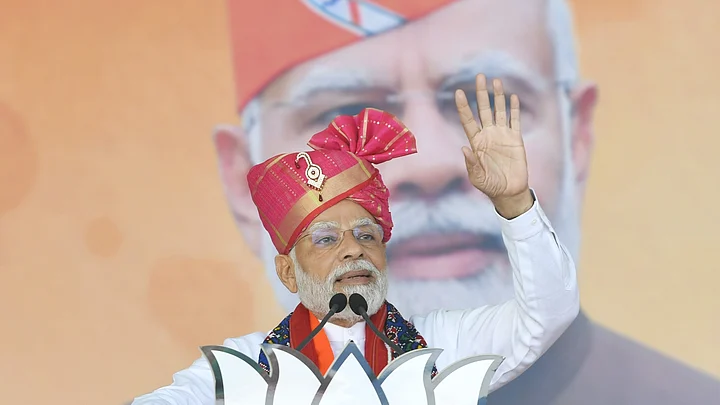Since the rise of Narendra Modi as the leader of the Bharatiya Janata Party (BJP), Indian elections have increasingly taken on the character of a presidential battle. This transformation has been marked by the centrality of the prime ministerial candidate in the electoral narrative, where voters are primarily appealed to in the name of Modi himself.
However, the unexpected results of the 18th Lok Sabha elections, where the BJP failed to secure a majority, indicate a significant shift in the party's image in the eyes of the electorate.
Modi's image has long been that of a larger-than-life figure, recently attempting to transcend the realm of ordinary politics into a quasi-divine domain.
His speeches and public appearances have reinforced this perception, portraying him as a messianic leader capable of delivering India from its myriad challenges. For his rise in 2014, Modi was much of the ‘Chowkidaar,’ implying the watcher and protector of citizens' rights and sovereignty.
By 2019, Modi had transitioned to the role of ‘Pradhan Sevak,’ implying responsibility for galvanising the soil’s and people’s rights along with their aspirations. In 2024, Modi's portrayal has evolved further, with a quasi-divine aura, suggesting a departure from traditional political roles to a more transcendent figure. This portrayal has been both a strength and a weakness, as it has spurred a dedicated base of supporters while alienating others who view his approach as autocratic and divisive.
One notable instance that highlights the dual nature of Modi's rhetoric was his speech in Banswara, where his remarks were stark and confrontational. Such speeches have often drawn criticism for their tone and content, suggesting a style that is more combative than conciliatory. This approach, while effective in rallying the base, has also contributed to a polarising political atmosphere.
The evolution of voter preferences over the past decade provides a quantitative measure of Modi's fluctuating influence.
In the 2014 Lok Sabha elections, 28 percent of voters considered the prime ministerial candidate a crucial factor in deciding whom to vote for, according to the Lokniti-CSDS NES 2014 Post Poll. By the 2019 elections, this percentage had dropped to 17 percent, indicating a diminishing impact of the prime ministerial candidate on voting decisions.
This trend continued into the 2024 elections, where only 10 percent of voters considered the prime ministerial candidate a decisive factor. This decline signifies a reduced influence of the prime ministerial persona in shaping electoral outcomes.
These numbers reveal a significant shift in the political landscape. The 2019 elections saw 47 percent of voters favouring Modi as prime minister, but by 2024, this preference had decreased to 41 percent. This drop is indicative of a broader disillusionment with Modi's leadership, as well as a growing desire among voters for alternative political narratives and candidates.
Several factors may have contributed to this decline in Modi's appeal.
The handling of the COVID-19 pandemic, economic challenges, and contentious policies such as the Citizenship Amendment Act (CAA) and the abrogation of Article 370 have been polarising issues. While these actions have solidified his support among certain segments, they have also sparked significant opposition and protests, leading to a more fragmented electorate.
Furthermore, the personalisation of politics around Modi has meant that the BJP's successes and failures are often viewed as his own. This concentration of both credit and blame can be a double-edged sword. As the initial euphoria of his leadership wears off, and as practical concerns take precedence, the electorate's patience with grand promises and ambitious projects that take time to materialise may wane.
The politics of popular sociology play a crucial role in understanding Modi's fluctuating appeal. Modi's rise and sustenance have been deeply intertwined with his ability to tap into the collective psyche of a significant segment of Indian society. His transformation from the 'Chowkidaar' to the 'Pradhan Sevak,' and now to a quasi-divine figure, mirrors a narrative that resonates with the aspirations and fears of his supporters.
However, this very personalisation has also created a porous image, where the perception of invincibility is subject to the changing tides of public sentiment.
The 2024 Lok Sabha election results, where the BJP failed to secure a majority, highlight the evolving nature of Indian politics. Modi's once unassailable position appears increasingly porous, reflecting a broader shift in voter attitudes and preferences. While his image as a strong and decisive leader remains, the diminishing role of the prime ministerial candidate in influencing voting decisions signals a potential recalibration of political strategies and narratives in the years to come.
The fall of Narendra Modi, if it indeed transpires, will mark a significant turning point in India's democratic journey.
(Nirmanyu Chouhan is the Program Coordinator at Lokniti-CSDS, specializing in Indian politics and its developments. This is an opinion article and the views expressed above are the author’s own. The Quint neither endorses nor is responsible for them.)
(At The Quint, we question everything. Play an active role in shaping our journalism by becoming a member today.)
